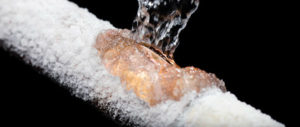
Well it’s that time of year again. Getting prepared for cold snowy days. Getting your home winterized should also be on the top of your list. Most of us are very diligent about making sure our homes are prepared for the subfreezing days of winter.
I’ve heard since I was big enough to remember that one of the best things to do in the winter, when it’s below freezing outside, is to “Let your faucets run to prevent your water lines from freezing”. Although this is still considered sound advice for some cases, I’m just not sure it applies to many peoples’ homes anymore.
I began my career in the drinking water industry about 20 years ago as a Drinking Water Treatment Plant and Drinking Water Distribution System Operator along with spending a small portion of my time as a Waste Water Treatment Plant Operator. Seems every winter I heard talk around the local “round tables” of freezing temps coming and make sure to leave your water faucets running. I’ve always wanted to say please don’t do that as I am one of the less fortunate workers who will have to work an extra few hours a day through those important holidays with the family because everyone is “wasting” so much drinking water.
As a Drinking Water System Operator it’s been driven into my head to keep a short leash on water loss in my system. Having been taught all these years how important that is, in keeping cost of daily operation down, it just doesn’t make since to me why you should ask someone to let their water, that I worked so hard to make available, and they used their hard earned money to pay for, just run out on the ground or into the sewer system. Letting a leaking faucet go or just running the water, when not necessary puts a tremendous strain on the water utilities across the state. We all want our utilities to stay affordable and if we continue to waste, they will struggle to keep those costs tolerable.
I recently read an article about a study done by the University of Illinois that took a look at what actually causes a pipe to rupture during freezing weather. It was a very in depth study done over several winters that covered every aspect of freezing water pipes in homes in the southern US. It was discovered that what actually causes the pipes to rupture wasn’t the ice, it was the pressure that the “growing” ice caused in a closed system. Once the ice creates a blockage the rupture will occur between the blockage and a closed fixture in the system. That’s why you usually see the rupture somewhere inside the home. It will always seek out the weakest point in the system. It was found in the study that freezing pipes can reach pressures as high as 5000 psi in a closed system. While you’re not apt to see pressures such as that in a residential setting, it is a little scary that such a destructive force can be found lurking in a water pipe.
It was proven in the study that just allowing a little drip at a faucet is just enough to relieve the pressure caused by the freezing water and will prevent the pipe from rupturing in most cases. It was also proven that letting the water run will “not” prevent the freezing from occurring, it will only prolong the effects of the freezing temps. Given the proper conditions the pipe full of water will still freeze, it will just take a little longer. The study also showed that during the freezing process, the ice will grow in the direction of coldest water to warmest due to the process of heat exchange. This being another reason why most ruptures occurs inside the home.
I’ve always thought that this same process happens in an above ground water storage tank. Though it looks different than a water pipe, it has the same characteristics, as far as the water is concerned. Therefor the water in the storage tank is forming ice at the same or a faster rate than the water pipes in or around your home because it is exposed to more extreme temps than the water in your home is. It is possible that you are introducing water into your home that is closer to freezing conditions than what has set in your home for some time.
In conclusion, it may be necessary for some people in some cases to let their water run to keep from rupturing their plumbing. It is not necessary for all people to do this just because their grandparents did it, or the weather man said too. It is very important to evaluate conditions in and around your own home and make that decision on your own, or have a professional take a look at it. It may be cheaper to alleviate any problems that may cause your water pipes to freeze instead of letting your water run. Insulating water pipes in your crawl spaces or attics will help prevent freezing. Moving water pipes from outside walls to inside walls will also prevent freezing. I recommend that letting a faucet run should be a last resort.
In this case a little preventative maintenance on your own home may result in helping the whole community. For questions or advice this winter please feel free to contact us.

